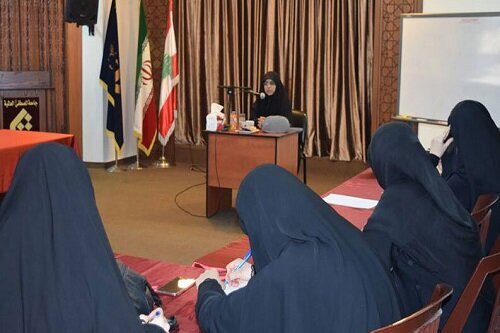Hawzah News Agency- Seyedah Zahra (PBUH) seminary is the first women seminary in Lebanon, which was founded by Martyr Sayyed Abbas Mousavi in 1979. The attention of this seminary to the education of Muslim women has been exemplary. The existence of the women dormitory has distinguished this school from other seminary schools, and people from all regions of Lebanon and even from Syria come to this school to study.
Mrs. Hale Hakim, director of Seyedah Zahra seminary in Lebanon, in an interview with the Hawzah News Agency, introduced the activities of this seminary and the necessity of synergy and cooperation between women's seminaries in Iran and Lebanon.
The text of the interview is as follows:
Hawzah News: Please introduce the background of Seyedah Zahra (PBUH) seminary and the activities of this seminary school.
This seminary is the first women's seminary in Lebanon, which was founded by Martyr Sayyed Abbas Mousavi (RA) and his wife in 1979. At the beginning of the establishment of this seminary, there was a special situation in the Bekaa region and there was a lot of ignorance about religious affairs, especially among the women of this region. Religiosity in the form of an original and natural tendency that existed in the human institution throughout history was also present in the people of that time, but they were very ignorant of the Sharia rulings and religious concepts.
Therefore, the idea of establishing a seminary in this area was raised. The establishment of Seyedah Zahra seminary (PBUH) had two goals; First, to open an opportunity to learn religious sciences, rulings and concepts, and on the other hand, to form a collection and group of young women and girls who will be empowered in the field of work and religious propagation among women and in the awakening of the women's society towards knowledge, science, religion and Consciousness to play a role, which was one of the goals of establishing this seminary.
Hawzah: What activities did the students who studied in this seminary do in their regions after graduation?
We are happy that this school initially trained a limited number of students, but over time, this number expanded in all villages and regions of Lebanon, especially in the Bekaa region, and fortunately, Lebanese women turned to this school for education, and hundreds of them have graduated so far.
The activities of Lebanese female missionaries in schools and administrative centers
Today, a large part of these people are engaged in their Islamic activities in various fields, in the administrative field or in Islamic institutions as female missionaries, professors and lecturers of religious sciences.
Thank God, this seminary school has been able to operate in the field of religious and Islamic activities in the Bekaa region since its establishment, and especially after the victory of the Islamic Revolution in Iran, this seminary promoted the thoughts of Late Imam Khomeini (RA). And we were able to assume this responsibility for propagating among women and publishing Islamic thought and the path of authentic and pure Islam. Also, Seyedah Zahra (peace be upon her) seminary has managed to be effective in the awakening of the Lebanese women's community in religious and cultural aspects.
Hawzah: What is your opinion about the relationship between women's seminaries in Lebanon and Iran, and what are the achievements of such synergy for women's seminaries in Iran and Lebanon?
Undoubtedly, the cooperation between women's seminaries is important and necessary; therefore the Lebanese seminaries are connected with each other and with the seminaries in Iran, because the Islamic Republic of Iran is like Umm al-Qura and supports its children outside of Iran.
It is very useful and necessary to establish a connection between all the Shia schools and the main schools in Iran, this gives more power and authority to the seminaries and is effective in transferring experiences and cooperation between the schools; such constant cooperation leads to the strength and fruitfulness of the seminaries will increase.
Seminaries also play an important role in the soft war, and they have a huge responsibility in this regard, because they have a direct relationship with the correct dissemination of religion and the promotion of religious knowledge.




Your Comment